|
August 1956 Popular Electronics
 Table of Contents Table of Contents
Wax nostalgic about and learn from the history of early electronics. See articles
from
Popular Electronics,
published October 1954 - April 1985. All copyrights are hereby acknowledged.
|
 This 1956 Popular
Electronics magazine article reports on
the very earliest form of voice mail - recording a message on a reel-to-reel tape
deck, placing it in an envelope, and snail mailing it to its recipient. Sure, it
was slow, but unless you were under surveillance for some suspected crime, there
was just about zero chance that some government agency was going to hear your private
message. I had forgotten about it until reading this, but I
remember
that back in the 1960s, my father bought an el cheapo tape deck
(like the one at the left) for our family and one
for his parents, who lived in Buffalo, New York. My parents and four sisters and
I had a pretty good time hamming it up on the tape, and looked forward to receiving
a reply tape a month or two later. "Grandpa B," as we kids called him, was a real
funny guy and kept us entertained for about 30 minutes with the reply tape. The exchange lasted for
about a year and then our machine died (I probably broke
it by opening the case and screwing with it) and then it was back to the
long distance phone calls once or twice a year. This 1956 Popular
Electronics magazine article reports on
the very earliest form of voice mail - recording a message on a reel-to-reel tape
deck, placing it in an envelope, and snail mailing it to its recipient. Sure, it
was slow, but unless you were under surveillance for some suspected crime, there
was just about zero chance that some government agency was going to hear your private
message. I had forgotten about it until reading this, but I
remember
that back in the 1960s, my father bought an el cheapo tape deck
(like the one at the left) for our family and one
for his parents, who lived in Buffalo, New York. My parents and four sisters and
I had a pretty good time hamming it up on the tape, and looked forward to receiving
a reply tape a month or two later. "Grandpa B," as we kids called him, was a real
funny guy and kept us entertained for about 30 minutes with the reply tape. The exchange lasted for
about a year and then our machine died (I probably broke
it by opening the case and screwing with it) and then it was back to the
long distance phone calls once or twice a year.
Voices in the Mail
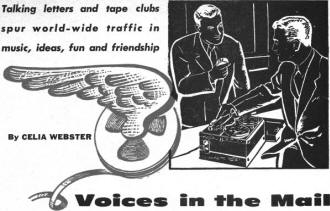 Talking letters and tape clubs spur world-wide traffic in music, ideas, fun and
friendship Talking letters and tape clubs spur world-wide traffic in music, ideas, fun and
friendship
By Celia Webster
From coast to coast, round the world and
back again, the mails are now carrying small, flat boxes. Inside the boxes are voices.
And the voices are spoken letters on magnetic tape.
Tape recording helps form friendships through various clubs which have been organized
throughout the world. The four leading tape correspondence clubs which have appeared
in the past few years are World Tape Pals, International Tape-worms, Tape Respondents
International, and Voicespondence.
Instead of being "pen pals," the members of these organizations talk with each
other on tape. They have found it a fascinating and deeply rewarding hobby. Magnetic
tape brings friendship to the lonely, knowledge to those eager to learn, reading
to the blind, and adventure to armchair travelers.
Often the narrow strip of tape forms a firm bridge between people of different
countries and continents. It acts as an emissary of better international relations,
carrying the human voice, warm and convincing, across all geographic and political
barriers.
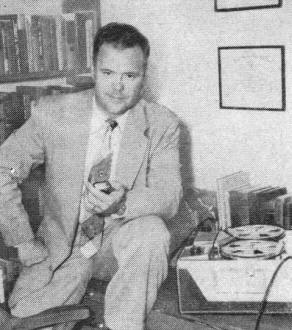
Prof. James H. Boren heads the International Committee on Tapes
for Education, sponsored by World Tape Pals to encourage exchange of tapes among
students and teachers of various countries.
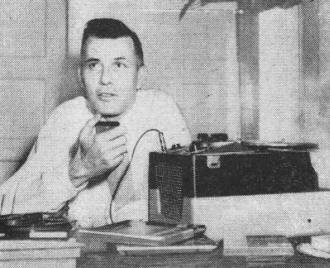
Harry Matthews, a printer from Dallas, Texas, is the founder
and secretary of World Tape Pals.
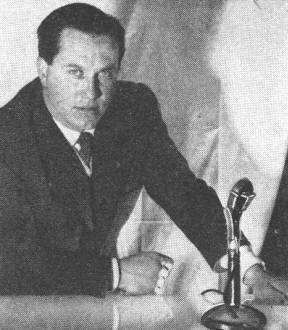
Chile - Fernando Ceruti of Vina del Mar won first place at the
International Amateur Recording Contest. Ceruti entered his binaural recordings
of Chilean orchestral music through World Tape Pals.

England - A warm friendship has been formed by the tape exchanges
of Margery Elliott of Birmingham with the B. Sam Taylor family of Medford, Oregon.
She plans to travel over 14,000 miles to visit them this summer and to see the United
States.
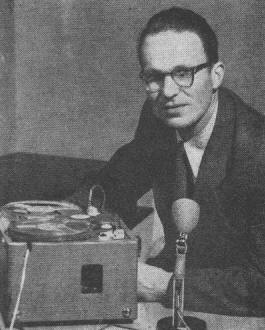
Germany - Erich Bomke of West Germany uses technical skill and
excellent equipment to send German folk music to his friends all over the world.
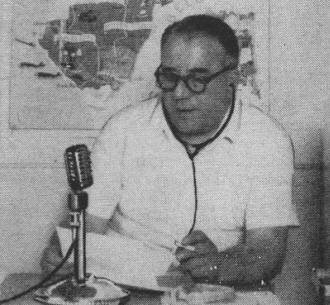
Switzerland - Wilfred Francfort tapes a news commentary in his
role of reporter. A dentist by profession, he is head of the Swiss Sound Chasers
Association and assists news agencies and radio stations with on-the-spot recordings.
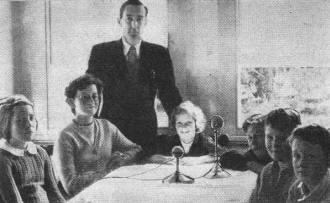
New Zealand - John E. MacDonald, headmaster, and six pupils from
Taupaki School, Auckland, make a tape recording to be sent to Shady Cove School,
Oregon, USA. MacDonald is known to other World Tape Pals for his excellent recordings
of Maori children singing folk music, and for the interesting 35-mm. slide shows
with tape commentary which he exchanges with other members.
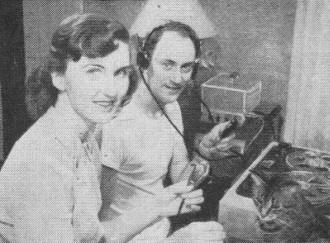
"Snoopy" the cat, took up the tape hobby of his roommates, Don
and Millie Edwards. He exchanges meows with lots of other cats.
People from all walks of life make up the rosters of the tape clubs. They include
teachers, firemen, business executives, artists, writers, professors, doctors, students,
farmers, truck drivers, policemen, bankers, grocerymen, and many others.
Hobby Exchange.
The tape correspondence clubs act as clearing houses to bring members with similar
tastes and hobbies in contact with one another. The brochures of these clubs contain
long lists of varied subjects in which the members are interested. A new participant
chooses a few members as his special tape pals, and tape-responds with them. The
same tape can be erased and used over and over again, continually sent back and
forth between the same two members; or a spoken letter can be permanently retained.
Here are some typical listings from the Membership Roster of World Tape Pals:
John J. Pollock, Red Deer, Alberta, Canada. High school woodwork instructor;
age 38, married, Revere T-700 and Revere T-1100 recorders. Two daughters: Carolyn
14, and Susan, a toddler, Wife, Mary, also interested in WTP. Photography in color,
and in black and white, and processing. We like music and radio programs not available
on commercial records - folk music of other countries - and clever disc jockeys;
good drama. Let's discuss current affairs, philosophy, history"(modern and ancient),
archaeology, and education in other lands. Send me some of your favorite music,
and a little chin-wag so we can get going. English only spoken.
Richard A. Drost, 1743 W. Nelson St., Chicago 13, Ill. Operatic singer; age 20,
single. Wilcox-Gay 3A10. Also three-speed disc recorder, operatic and classical
vocal music. English, Italian, and some Swedish spoken. I am handicapped to a small
extent with muscular dystrophy and have about 90 disc-recorded complete Met radio
operas which might be of interest to some WTP. Also would like to receive some vocal
music taken from RAI (Italy), the BBC (England), or from German radio.
Henk Johan Mulder, Fisherstr. 88, The Hague, Netherlands. Grocer; age 31, married.
Philips recorder. I would like to receive a real impression of the American way
of life. Dutch and English spoken.
The cost of mailing a 3" tape reel in the United States is only a few pennies
two cents for third class, six cents for first.
Tape correspondents consider "talking" letters infinitely superior to written
ones because they can add a background of authentic sound effects. Erik Lindgren,
of Sweden, puts it like this:
"How exciting it is to listen to tapes from a friend in Beirut, recorded against
a background of the exotic cries of Arab hawkers from the street."
Words and Music.
Exchanging folk songs with people in all parts of the world is in itself a fascinating
sideline. What's more, this exchange can take place even where language difficulties
prevent the exchange of elaborate personal messages. For example, World Tape Pals,
the most far-flung of all tape clubs, reaches 48 countries and their colonies. "We
trade a lot of music since it is the international language," says Harry Matthews
of World Tape Pals. "But where there is no language barrier, we start off more long-distance
conversations on such subjects as freedom." Far from being inane gab-fests, these
exchanges are conducted on a surprisingly mature level.
Of course, tape corresponding is an ideal way to improve one's knowledge of a
foreign language once the fundamentals are mastered. You not only get the proper
accent of native speech, but you also gain insight into the opinions, customs arid
attitudes of different people. It is precisely this kind of interchange that creates
more good will at the grass-roots level (where it counts) than all sorts of official
stale visits. Next to traveling in person, tape exchange with people in other countries
is one of the best ways to develop a broader understanding of the world in which
we live.
If you have no knowledge whatever of any foreign language, you can still get
plenty of fun and satisfaction from international tape correspondence. English,
after all, has become an internationally spoken language and most overseas tape
correspondents can speak it. Lars Svensson, a Swedish member of the Voicespondence
Club, uses the English language so much with his foreign tape friends that he finds
it strange communicating in Swedish when he talks to his tape-pal countrymen. "Many
members of the various organizations, after having exchanged taped messages for
a period of time, often plan their vacations in other cities and different parts
of the world where their tape pals live.
Even the old-fashioned round-robin letter has its tape equivalent. This works
on the principle of combining different recordings on a single tape. With the help
of a church organist, the originator of the idea, Bob Crouse, a Voicespondence member,
chose a familiar hymn and taped it on his recorder. He then mailed the tape to a
tape pal in another state who played it on his own machine while rerecording it
on a borrowed machine and at the same time singing in harmony with the original.
The re-recorded tape was then sent on to another member who played the tape, re-recorded
on another machine and sang simultaneously to complete the master tape. A bit complicated,
but fun! They now have three master tapes of the trio who blended their voices in
three different states.
Tape fans catch on quickly to the tricks of the audio trade. Often their letters
are imaginative blends of talk, background sound effects and music, edited with
a skill that would do credit to professional producers of radio shows. Of course,
tape correspondents swap tips and ideas about the technical side of their hobby.
Often they transcribe and trade radio programs, live entertainment, or lectures
from their particular countries. Such tapes sometimes have real documentary value.
World Tape Pals was founded by Harry Matthews, a printer from Dallas, Texas.
It grew out of Harry's former hobby of short-wave amateur radio. As a ham, he liked
to chat by radio with people from practically everywhere. But often unfavorable
atmospheric conditions kept him and his friends from getting through to one another.
Harry then thought of tape correspondence to supplement his ham contacts. While
this lacks the spontaneous give and take of ham radio conversations, he found that
by carefully preparing and editing his tapes, inserting on-the-spot items, etc.,
he could exchange a wider range of more meaningful news with his friends. He also
gets out a small newspaper called "Tape Topics."
Mrs. Matthews has been swapping tape-recorded recipes with housewives from other
countries. One from Australia suggested kangaroo-tail soup made like oxtail soup.
Mrs. Matthews taped back a sad report about the perennial shortage of kangaroos
in Texas.
Special Projects.
World Tape Pals has organized a "tape bank." This is a sort of lending library
consisting of hundreds of interesting and worthwhile tapes from practically everywhere
on a wide variety of subjects. Lately, the tape bank has branched out into projects
that present a real challenge to the imagination of tape correspondents. They set
up a group called "World Tapes for Education." This is a planned program for interchanging
tapes chiefly between schools, teachers, and students the world over.
Other tape clubs also have their special projects. The Voicespondence Club, under
the guidance of Charles and Melva Owen, organized what they call a Committee For
The Blind to aid the blind members in getting the best results from their recorders.
They are also enlisting volunteers to read to them via tape.
Another group called International Tapeworms has been concentrating its recording
efforts on the men and women in the Armed Services. Art Rubin, top Tapeworm, records
the messages for them on his recorders and the families pay the postage. When the
tapes are received at camp, they are taken to the Red Cross headquarters where they
can be played. Many service men and women who have been away from home for a long
time find this warm, gratifying method of communication much more satisfying than
a letter because it brings the actual voices of their families to them.
The broader meaning of the tape clubs extends far beyond their actual membership
to all of us who are interested in electronics. For in a world where electronics
must often serve purposes of war and build barbed fences of propaganda between people,
the unifying work of the tape clubs and their human sidelights set a heartening
counter-theme.
Want to Join a Club?
Tape Respondents International
Jim Greene, Secretary
P. O. Box 21, Dept. T.
Little Rock, Ark.
The Voicespondence Club
Charles Owen, Secretary
Noel, Virginia
World Tape Pals
Harry Matthews, Secretary
P. O. Box 9211
Dallas, Texas
International Tapeworms
Art, Rubin, National Chairman
P. O. Box 215
Cedarhurst, L. I., N. Y.
Global Recordking Friends
Alfred L. Sferra, D.D.S., Secretary
125 Hamilton St.
Bound Brook, N. J.
Posted February 3, 2023
(updated from original post on 4/4/2016)
|









 This 1956 Popular
Electronics magazine article reports on
the very earliest form of voice mail - recording a message on a reel-to-reel tape
deck, placing it in an envelope, and snail mailing it to its recipient. Sure, it
was slow, but unless you were under surveillance for some suspected crime, there
was just about zero chance that some government agency was going to hear your private
message. I had forgotten about it until reading this, but I
remember
that back in the 1960s, my father bought an el cheapo tape deck
(like the one at the left) for our family and one
for his parents, who lived in Buffalo, New York. My parents and four sisters and
I had a pretty good time hamming it up on the tape, and looked forward to receiving
a reply tape a month or two later. "Grandpa B," as we kids called him, was a real
funny guy and kept us entertained for about 30 minutes with the reply tape. The exchange lasted for
about a year and then our machine died (I probably broke
it by opening the case and screwing with it) and then it was back to the
long distance phone calls once or twice a year.
This 1956 Popular
Electronics magazine article reports on
the very earliest form of voice mail - recording a message on a reel-to-reel tape
deck, placing it in an envelope, and snail mailing it to its recipient. Sure, it
was slow, but unless you were under surveillance for some suspected crime, there
was just about zero chance that some government agency was going to hear your private
message. I had forgotten about it until reading this, but I
remember
that back in the 1960s, my father bought an el cheapo tape deck
(like the one at the left) for our family and one
for his parents, who lived in Buffalo, New York. My parents and four sisters and
I had a pretty good time hamming it up on the tape, and looked forward to receiving
a reply tape a month or two later. "Grandpa B," as we kids called him, was a real
funny guy and kept us entertained for about 30 minutes with the reply tape. The exchange lasted for
about a year and then our machine died (I probably broke
it by opening the case and screwing with it) and then it was back to the
long distance phone calls once or twice a year.








